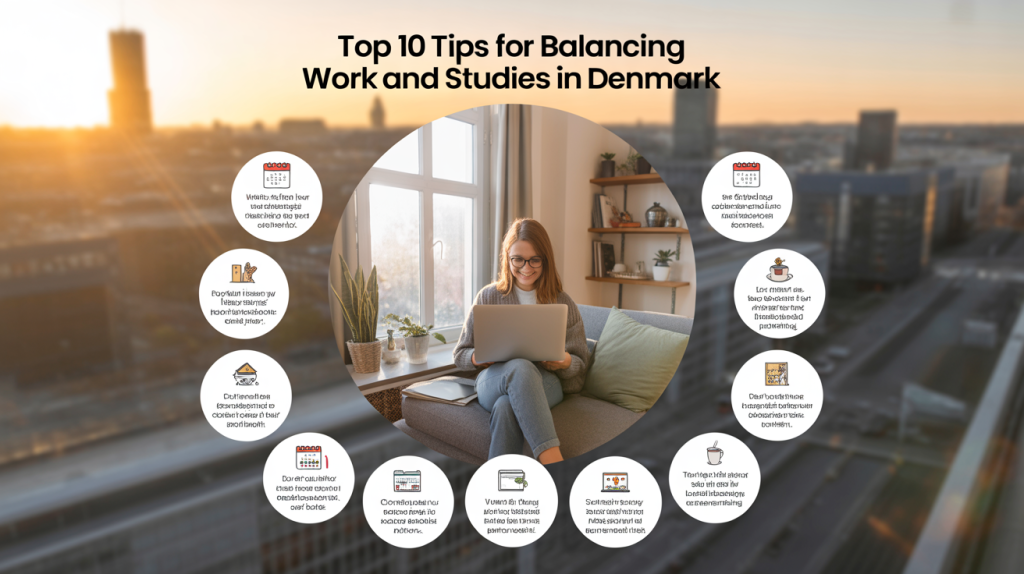Top 10 Tips for Balancing Part-Time Work and Studies in Denmark
Quick Navigation
- Be Aware of Legal Work Limits
- Prioritize Flexible Work Arrangements
- Communicate Transparently with Employers
- Integrate Work with Study Goals
- Take Advantage of Danish Work-Life Balance Culture
- Manage Your Time Effectively
- Leverage Employer Support During Exams
- Cultivate a Support Network
- Use Campus Resources
- Regularly Review Your Commitments
1. Be Aware of Legal Work Limits
Understanding the legal framework regarding work is crucial for international students in Denmark. Generally, students can work:
- 10-20 hours per week during the academic semester.
- Non-EU/EEA students are allowed to work up to 90 hours per month.
- Full-time work is permitted during summer months (June–August).
Adhering to these legal limits is essential to avoid jeopardizing your residence permit. It’s advisable to stay informed through your university’s guidance or relevant legal sources regarding any updates to work regulations.
2. Prioritize Flexible Work Arrangements
Many local employers recognize the unique challenges faced by students and offer flexible work schedules.
- Seek jobs that allow for time off during exam periods or important project deadlines.
- This flexibility can significantly ease the pressure of balancing both work and studies, allowing you to prioritize your education when necessary.
3. Communicate Transparently with Employers
Effective communication is key in the Danish workplace.
- Be open with your employer about your academic commitments. Share your exam schedule and any critical study deadlines that may require adjustments to your work schedule.
- Most employers in Denmark value honesty and will appreciate your proactive approach to managing your work and academic commitments.
4. Integrate Work with Study Goals
Finding employment that complements your academic studies can be beneficial in various ways:
- Look for jobs or internships related to your field of study. This can provide practical experience that enhances your resume.
- In some instances, you may be able to use your work experiences as case studies or even collaborate with your employer for your thesis.
5. Take Advantage of Danish Work-Life Balance Culture
Denmark is well-known for its emphasis on work-life balance, which is a vital aspect of student life as well.
- Establish clear boundaries regarding work hours to ensure you reserve time for relaxation, personal interests, and social activities.
- A balanced lifestyle contributes significantly to your well-being, enhancing both your academic performance and work effectiveness.
6. Manage Your Time Effectively
To navigate the demands of work and study successfully, effective time management is essential.
- Schedule your week in advance, clearly allocating time for study sessions, work shifts, and personal downtime.
- Utilize planners or digital calendars to keep track of your commitments and avoid last-minute schedule clashes.
7. Leverage Employer Support During Exams
Employers in Denmark generally understand the academic pressures on students and often extend their support during exam periods.
- Feel comfortable approaching your employer for a more flexible schedule or the possibility of lighter duties during particularly challenging times.
- This understanding can alleviate stress and help you perform your best both academically and in your job.
8. Cultivate a Support Network
Building connections with fellow students can be incredibly advantageous.
- Many students work part-time jobs, so forming a network can lead to valuable job leads and sharing of experiences.
- Peer support can also be a good source for stress management, as sharing challenges can enhance your overall coping mechanisms.
9. Use Campus Resources
Most Danish universities provide career services to assist international students in finding suitable work opportunities.
- Engage with university career counselors for advice on job searching, interview preparation, and balancing work with studies.
- Campus resources are not only helpful in finding jobs but can also aid in creating feasible strategies for maintaining a healthy study-work-life balance.
10. Regularly Review Your Commitments
As an international student, your workload may change throughout your academic journey.
- Periodically assess both your academic and work commitments. If you find your studies becoming too demanding, don’t hesitate to adjust your work hours.
- Prioritize your academic progress and well-being; maintaining a healthy balance is crucial in maximizing your experience in Denmark.
Take the Next Step with Study in Denmark
Explore further to find the best opportunities for your studies in Denmark.




